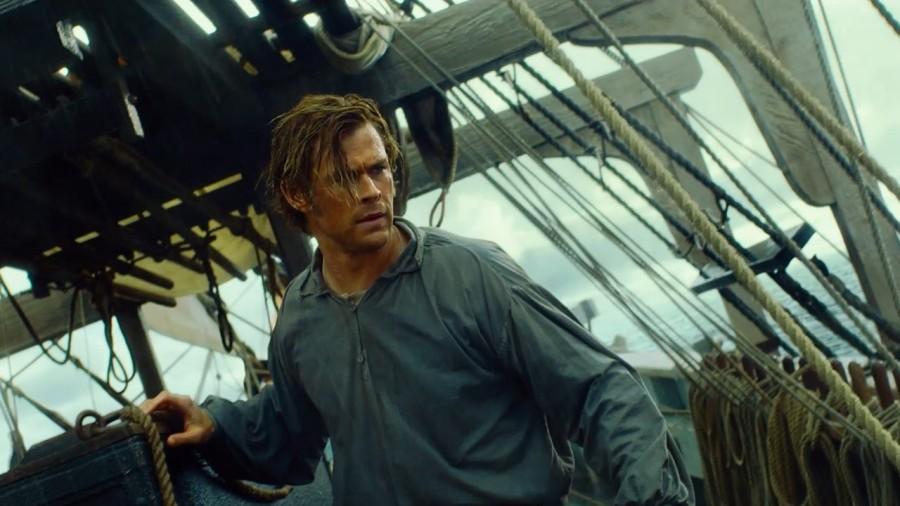Now Showing: In the Heart of the Sea
December 16, 2015
In 1851, American author Herman Melville published his classic tale of a great monster of the sea, “Moby Dick.” Director Ron Howard took on the ambitious task of creating a film worthy of such an American classic, yet it is only the dedicated cast that does the story any justice.
“In the Heart of the Sea” makes an attempt to reveal the origins of Melville’s great epic, and the men who inspired the tale. Though at times hard to watch, the film makes a powerful statement, showing its audience that the only thing stronger than the currents of the ocean, is man’s will to survive.
The film begins with Melville attempting to persuade the lone survivor of the Essex, a Nantucket whaling ship, to tell him the harrowing tale of his survival. The man, later revealed to be Thomas Nickerson, is reluctant at first, knowing that the monstrosities he had committed to survive would not be understood by those who had not gone through such turmoil. In need of money, Nickerson concedes, and the film shifts to the story 30 years earlier. Nickerson was only 14 when he first boarded the Essex, a beautiful ship tainted only by the tension between its captain and first mate.
First mate Owen Chase, played by the Australian actor Chris Hemsworth, is a respected whaler who had hoped to become captain in order to support his growing family. He is forced to work under the guidance of George Pollard (Benjamin Walker,) the son of a rich whaling patriarch, who is unprepared for the responsibility the comes with such a distinguished position. As the Essex sets out on its journey to bring home barrels of oil, it is clear that the dissonance between its crew members will cause problems.
The crew of the Essex does not experience much success, and as tensions grow, a new enemy is introduced. The sailors had originally dismissed the rumors of a monstrous white whale as ridiculous, until they came face to face with the animal. Apparently on a mission to avenge the horrors committed against his species, the white whale attacks all those who sail into his waters. The crew of the Essex much put aside their differences in order to survive, while the white keeps a watchful eye upon them.
Though Howard could have easily made “In the Heart of the Sea” an action packed film, riddled with ridiculous special effects and unrealistic action scenes, he makes the attempt to explore the true battle of man versus nature. The men aboard the Essex are pushed to their absolute limits, growing wild with hunger, and physically deteriorating as the film progresses. Their determination to survive is admirable, but their physical metamorphosis is hard to watch, and left me feeling very unsettled. Hemsworth lost much of his muscle mass in order to portray the stranded seaman, and while this representation is realistic, it is very disturbing. “In the Heart of the Sea” is not a pleasant movie.
Hemsworth, who is typically recognized for his good looks rather than his acting, has proven his skills in his role of first mate Owen Chase. As the true leader of the crew, he is strong and manly, yet grows to appreciate and respect both his crew, and his prey. Whaling had been his only source of income, and up until his terrifying interactions with the white whale, he had viewed the whales as nothing more than an opportunity to get large profits. Hemsworth honestly portrays the struggles of a man facing starvation while at sea, and manages to deliver the most heartbreaking performance of the film.
Howard is well known for his inspirational and thrilling films, such as “A Beautiful Mind” and “Apollo 13,” yet “In the Heart of the Sea” fails to match up with his previous work.
The film could have been great, yet is held back by Benjamin Walkers bland performance of Captain Pollard, and by the lack of depth in which it explores the relationship between hunter and prey.Either way, I was disappointed in the film, knowing that it had much potential that was not reached due to the shallow demands of audiences for more action, and less emotion.




